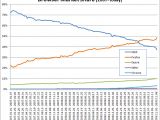Internet Explorer is not what it used to be. Firefox, but also additional rival browser such as Safari and Google Chrome, have eroded Microsoft’s dominance on the browser market. IE is left struggling even after the release of Internet Explorer 8 this year and with no end in sight to its downward trajectory. The Redmond company’s proprietary browser has continually bled audience to competitors, and it looks like on certain markets, Internet Explorer no longer occupies the dominant position. And it is only Mozilla’s Firefox to blame for IE being forced to give up the lion’s share of the browser market. According to statistics made available by Gemius Ranking, Firefox has overtaken Internet Explorer in terms of market share in Central and Eastern Europe.
The chart below, courtesy of Mozilla, indicated the trends on the browser market share data, from the start of 2007 until present day. Users need to understand that the information provided is in no way illustrative of the worldwide browser usage trends. Instead, the graphics only show data aggregated from users across nine countries: Czech Republic, Bulgaria, Estonia, Hungary, Lithuania, Latvia, Poland, Russia, and Ukraine.
As of mid-November 2009, Gemius put the market share of Firefox above that of Internet Explorer for Central and Eastern Europe, indicating that the number of Firefox page views is over 50% of the total page views, and larger than those of IE. Fact is that Central and Eastern Europe is a geographical area which is extremely favorable to Firefox. Mozilla’s open source browser has found here fertile soil to grow on, and has managed to grab a share of the market that is double compared to other locations around the world.
Data offered by metrics company Net Applications indicates that Firefox is closer to 25% worldwide, which IE retains the first position with approximately 65%. However, Net Applications, just like Gemius indicates that while IE is falling, Firefox is on the rise.
It remains to be seen what impact the launch of Windows 7 and the default IE8 component will have on the browser market. At the same time, in Europe, Microsoft will be forced to push an update to all Windows users letting them choose their specific browser, out of a selection of apps, including IE, Firefox, Chrome, Opera and Safari.
Microsoft has started talking about Internet Explorer 9, the successor of IE8, although the company said little to get end users enthusiastic about. According to the company, IE9 will deliver better JavaScript performance, on the same level as Firefox and Chrome, will support modern web standards such as HTML 5 and CSS 3, and will feature hardware acceleration for superior rendering.

 14 DAY TRIAL //
14 DAY TRIAL // 
